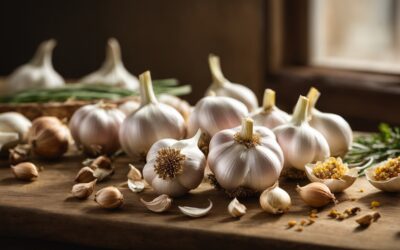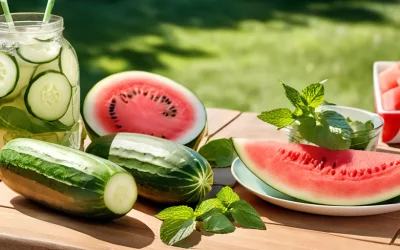Is cucumber a Vegetable or a Fruit? The debate continues to baffle many. While commonly thought of as vegetables due to their culinary use, botanically speaking, cucumbers are actually fruits. This contrast between popular perception and scientific classification often leads to confusion.
Cucumbers possess seeds and develop from the flower of the cucumber plant, meeting the botanical criteria for being a fruit. However, they are typically prepared and consumed in savory dishes alongside other vegetables, blurring the lines between their botanical identity and culinary application. Let’s delve deeper into this intriguing paradox surrounding cucumbers.
- Cucumber: Fruit or Vegetable?
- Cucumber: The Botanical Truth
- Culinary Classification: Cucumbers in the Kitchen
- Nutritional Profile of Cucumbers
- Health Advantages of Cucumber Consumption
- Innovative Culinary Creations with Cucumbers
- Cucumbers in Culinary Terminology and Diet
- Closing Thoughts
- Frequently Asked Questions
Cucumber: Fruit or Vegetable?
Botanical Classification
Cucumbers belong to the gourd family, which includes other fruits like pumpkins and zucchinis. From a botanical perspective, cucumbers are classified as fruits because they develop from the flower of the cucumber plant and contain seeds.
From a botanical perspective, any edible part of a plant that contains seeds is considered a fruit. In this case, cucumbers fit the bill perfectly; they develop from the flower and have seeds inside them. So, technically speaking, cucumbers are fruits despite being commonly referred to as vegetables in culinary contexts.
Culinary Usage
In everyday cooking and eating habits, we often refer to cucumbers as vegetables due to their savory flavor profile and common use in salads and savory dishes. This labeling is based on how we perceive their taste rather than their botanical classification.
The confusion arises because while botanically cucumbers are fruits, culinarily they are treated more like vegetables due to their usage in savory dishes instead of sweet ones like most other fruits. Despite this discrepancy between its botanical classification and culinary usage, it’s essential to understand both perspectives when classifying cucumbers.
Cucumber: The Botanical Truth
Botanical Classification
Cucumbers, a member of the gourd family Cucurbitaceae, are often debated as to whether they are a vegetable or a fruit. From a botanical perspective, cucumbers are classified as fruits due to their internal seeds and how they develop from flowers. This places them in the same category as other fruits like tomatoes and peppers.
Cucumbers come in various shapes, sizes, and colors. They can be long or short, smooth or spiky, and range from dark green to light yellow. Despite this diversity in appearance, all these variations fall under the same botanical definition of being fruits.
Nutritional Benefits
From a nutritional standpoint, cucumbers offer numerous health benefits. They are known for being highly hydrating due to their high water content. Cucumber skins contain fiber and antioxidants that can be beneficial for skin health.
Moreover, cucumbers are low in calories but high in essential nutrients such as vitamin K and potassium. Their crunchy texture makes them an excellent addition to salads or simply enjoyed on their own.
Culinary Classification: Cucumbers in the Kitchen
Savory Vegetable
In the culinary world, cucumbers are predominantly regarded as vegetables due to their savory flavor profile. Their fresh, crisp texture and subtle taste make them a versatile ingredient in various dishes. From vibrant salads to zesty pickles, cucumbers contribute a refreshing and crunchy element that complements other ingredients.
Cucumbers belong to the gourd family, which includes other popular vegetables like pumpkins and zucchinis. This classification further solidifies their status as a vegetable in culinary applications. For instance, when sliced thinly, cucumbers can enhance the visual appeal of a dish while also adding a delightful crunch.
Versatile Ingredient
In terms of culinary definition, cucumbers are celebrated for their ability to add depth and complexity to recipes without overpowering other flavors. They are often used in beverages like cucumber-infused water or cocktails for their refreshing essence. Furthermore, they serve as an essential component in Greek tzatziki sauce, providing both flavor and texture.
Cucumbers truly shine in the kitchen; they effortlessly transition from being part of a light summer salad to becoming tangy bread-and-butter pickles with just some vinegar and spices.
Nutritional Profile of Cucumbers
Hydrating and Refreshing
Cucumbers are incredibly hydrating due to their high water content, making them a perfect addition to your diet, especially during hot weather. Their low calorie content also makes them an excellent choice for those looking to manage or lose weight. The refreshing crunch of cucumbers can satisfy your hunger without adding significant calories.
Cucumbers are not only hydrating but also provide essential vitamins and minerals. They contain a good amount of vitamins K and C, which play crucial roles in bone health and immune function. They offer a notable dose of potassium, contributing to heart health, as well as dietary fiber that supports digestive health.
Antioxidants and Insoluble Fiber
The skin of cucumbers is rich in antioxidants and insoluble fiber, providing additional nutritional benefits. Antioxidants help combat oxidative stress in the body, potentially reducing the risk of chronic diseases. Meanwhile, insoluble fiber adds bulk to stool, aiding digestion by promoting regular bowel movements.
Health Advantages of Cucumber Consumption
Hydration and Weight Management
Cucumbers are made up of about 95% water, making them an excellent choice for staying hydrated. They are a perfect snack to keep you feeling full without adding many calories, supporting weight management.
Cucumbers also contain fiber, aiding in proper digestion and promoting a sense of fullness. This can be beneficial for individuals looking to manage their weight or improve their digestive health.
Nutrient Support for Overall Health
The nutrients found in cucumbers play a crucial role in maintaining overall health. For instance, the silica content in cucumbers contributes to skin health by boosting collagen production, while vitamin K supports bone strength.
The presence of antioxidants like flavonoids and tannins helps enhance overall immunity. These nutrients collectively contribute to improving skin quality, bone density, and immune function when cucumbers are regularly included in one’s diet.
Blood Sugar Levels and Chronic Disease Risk Reduction
Regular consumption of cucumbers may aid in lowering blood sugar levels due to their low carbohydrate content and certain plant compounds. This makes them an ideal addition to diets aimed at managing diabetes or preventing its onset.
Moreover, the various vitamins and minerals present in cucumbers can help reduce the risk of chronic diseases such as heart disease and certain types of cancer when consumed as part of a balanced diet rich in fruits and vegetables.
Innovative Culinary Creations with Cucumbers
Versatile Ingredient
Cucumbers are not just your average veggies; they can be transformed into a wide array of innovative and unexpected dishes. From savory dishes like cucumber gazpacho to refreshing cucumber-infused cocktails, the culinary possibilities are endless. You can also incorporate cucumbers into smoothies, salsas, or even desserts for a surprising twist.
Cucumbers are incredibly versatile and can be used in various forms – whether it’s slicing them for salads or pickling them to create tangy treats. Their mild flavor makes them an excellent addition to both sweet and savory recipes, adding a refreshing crunch to any dish. For instance, you can experiment with marinating, fermenting, or dehydrating cucumbers for diverse flavors and textures.
Unconventional Applications
The options are plentiful. Imagine creating sushi rolls filled with crunchy cucumber sticks for a delightful contrast in texture. Or how about using finely diced cucumbers as a topping for tacos or nachos? The crispness of cucumbers adds an unexpected element that elevates the overall dining experience.
In addition to their use in cold soups and salads, you might be surprised at how well cucumbers complement desserts. Whether blended into creamy smoothies or incorporated into light and refreshing sorbets, these green gourds bring a unique taste that pairs wonderfully with sweet flavors.
Cucumbers in Culinary Terminology and Diet
Versatile Culinary Terminology
Cucumbers are commonly known as “cukes” or “gherkins,” with the latter term typically used for smaller-sized cucumbers. These versatile vegetables can be pickled to create gherkins, which are popularly enjoyed as a tangy addition to dishes. Whether sliced, diced, or pickled, cucumbers bring a refreshing crunch to various culinary creations.
Incorporating cucumbers into different recipes allows for their unique texture and mild flavor to enhance both savory and sweet dishes. From fresh salads to chilled soups like gazpacho, these vegetables contribute a crisp bite that complements other ingredients. Moreover, their neutral taste makes them suitable for blending into smoothies or infusing water with subtle hints of freshness.
Nutritional Value in Diets
Adding cucumbers to one’s diet offers an array of health benefits. These vegetables are low in calories but high in essential nutrients such as vitamin K and potassium. Their high water content also contributes to hydration while providing a satisfying crunch during meals or snacks.
Incorporating cucumbers into daily meals not only introduces variety but also boosts the nutritional value of the overall diet. They serve as excellent additions to salads, sandwiches, wraps, and even sushi rolls – offering a hydrating element alongside other nutrient-dense ingredients.
Closing Thoughts
So, is a cucumber a fruit or a vegetable? It’s clear that botanically speaking, cucumbers are fruits, but in the culinary world, they are often treated as vegetables. The important thing to remember is that regardless of how you classify them, cucumbers are undeniably nutritious and versatile. Whether you’re slicing them up for a refreshing salad or blending them into a revitalizing smoothie, cucumbers add a crisp and hydrating element to your culinary creations.
Next time you’re in the produce aisle, grab some cucumbers and get creative in the kitchen. Try out new recipes, experiment with different flavor combinations, and embrace the wholesome goodness of this underrated ingredient. Let your culinary journey be as refreshing and adaptable as the cucumber itself!
Frequently Asked Questions
Is a cucumber a fruit or a vegetable?
Cucumbers are botanically classified as fruits because they develop from the flower of the cucumber plant and contain seeds. However, in culinary terms, they are often referred to as vegetables due to their savory flavor profile and common usage in salads and savory dishes.
What is the nutritional profile of cucumbers?
Cucumbers are low in calories and high in water content, making them hydrating. They also provide vitamins K and C, as well as various antioxidants. Cucumbers offer small amounts of fiber and some essential minerals like potassium.
Are there health advantages to consuming cucumbers?
Yes! Cucumbers can contribute to hydration, aid digestion due to their fiber content, support skin health with their vitamin C content, and provide antioxidant benefits that help combat inflammation in the body.
Can you share some innovative culinary creations with cucumbers?
Certainly! Cucumbers can be used beyond traditional salads; for example, they make refreshing additions to infused water or cocktails, serve as a crunchy element in sushi rolls or spring rolls, or even be pickled for tangy toppings on sandwiches or tacos.
How are cucumbers classified in culinary terminology and diet?
In culinary terminology, cucumbers are often considered vegetables due to their common use in savory dishes. From a dietary perspective, they’re typically categorized within the vegetable group due to their nutrient profile despite being botanically classified as fruits.





